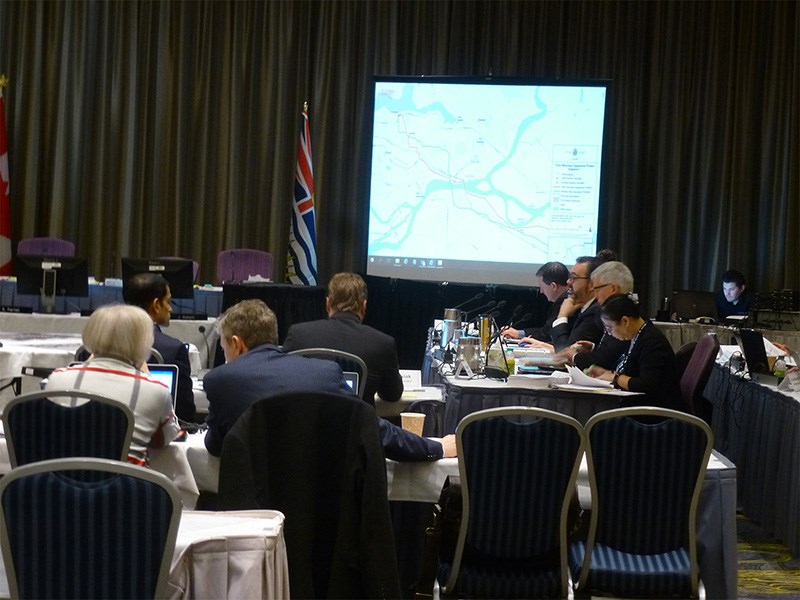The city of Coquitlam laid out its case Monday for opposing Kinder Morgan Canada’s pipeline route through the city, arguing before the National Energy Board (NEB) that unstable soils will cause settling around the the proposed pipeline, requiring costly road maintenance in the future and even reconstruction.
Speaking at an NEB hearing in Burnaby, Coquitlam’s utilities manager, Dana Soong, said roads are typically replaced every 15 years.
But if the proposed Trans Mountain pipeline is built under city streets in the United Boulevard business area — in “some of the worst soils you could possibly have,” Soong said — road work would have to be done every seven years.
According to the city, the extra work involved in dealing with Kinder Morgan for projects around the new pipeline, including extra bureaucracy, could add $59 million to city costs over 50 years, based on experience dealing with the existing oil pipeline that was put through the city in 1953.
Soong said the project should ensure that “Coquitlam taxpayers are not subsidizing Trans Mountain’s operation.”
He suggested the proposed pipeline should go through parking lots fronting businesses or in an adjoining boulevard, to avoid roads, a proposal that came as a surprise to Kinder Morgan’s team, which asked why the boulevard idea hadn’t been raised before and if the city had spoken to business owners about putting the pipeline in their parking lots and questioned what impacts that would have.
“No we have not,” Soong responded. “It’s not our responsibility, it’s the responsibility of Trans Mountain.”
Coquitlam’s legal representative, Stephanie James, asked if the proposal fully considered the fact that the road is part of TransLink’s Major Road Network and a busy truck and bus route.
Michael Davies, vice-president of operations and lead on the Trans Mountain Expansion Project, said that TransLink and Coast Mountain Bus Co. and been consulted, and the company was well aware of the high volume of traffic along the route.
He stressed measures would be taken to ensure businesses could remain open during construction, including keeping access points and one lane of westbound traffic open.
Under Kinder Morgan's proposal, the Trans Mountain pipeline route would start in Coquitlam from east of the Port Mann Bridge, where it comes in under the Fraser River, and travel along Rogers and Hartley avenues up to United Boulevard via an existing Trans Mountain pipeline right of way.
The NEB was told the route would avoid Colony Farm Regional Park and wouldn’t cause harm to Como Creek, a fish-bearing creek, which is already covered at the point of the pipeline crossing.
The route would skirt the King Edward overpass and would travel around the Eagle Quest golf course and driving range, the NEB was told, with special consideration by consultants about possible contamination because the area is a former landfill site, leaving Coquitlam for Burnaby near the Brunette interchange.
Among the challenges are the fact the area has many utilities traveling through it, including BC Hydro lines and a railway as well as a freeway, businesses and other issues, Davies said, resulting in the chosen route.
But it appeared the city and Trans Mountain had differing views of the benefits of the proposed route, and Soong wasn’t convinced the city wouldn’t be left with costly repairs after construction is concluded.
“We deal with those impacts through the life of the asset,” he said, noting that the city will likely have work such as patching and installation of catch basins if the road settles unevenly over the pipeline construction.
Trans Mountain legal representative Martin Ignasiak asked when the city had repaved United Boulevard, suggesting it hadn’t been repaved since it went in in 1980, and wanted one city comment struck from the record, noting that detailed evidence hadn’t been presented about uneven settling.
It was also pointed out that Trans Mountain planned to put in two metres of fill to match the weight of the soils in the area to prevent settling.
The NEB's detailed route hearings for the Burnaby section of Kinder Morgan’s $7.4-billion Trans Mountain expansion project will continue to today (Wednesday), then from from March 12 to 22, with a decision on the Coquitlam portion of the route expected in about three months.
The federal government approved the project in November 2016 — subject to 157 conditions — along a 150-metre-wide corridor. Once twinned, it's expected the Edmonton-to-Burnaby pipeline will carry 890,000 barrels of diluted bitumen daily from Alberta’s tar sands.



